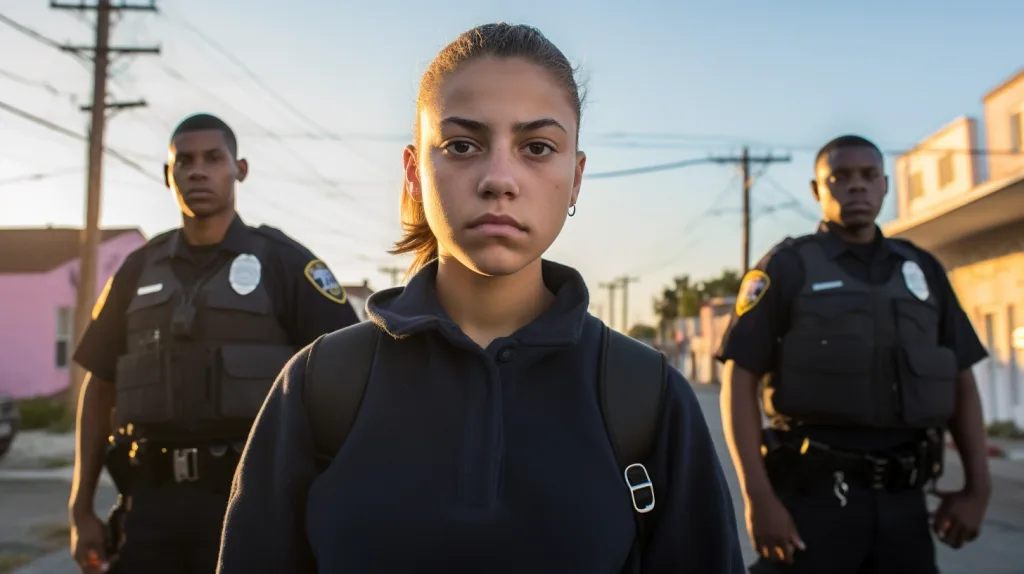What happens if you get caught with a Fake ID under 18
Introduction
“What happens if you get caught with a Fake ID under 18?” This question captures the attention of many young people across the United States, drawn by the allure of what lies beyond the velvet rope of adulthood—whether it’s purchasing alcohol, accessing exclusive venues, or partaking in other age-restricted activities. The consequences of being discovered with a counterfeit identification are grave, and the legal complexities minors face in such situations are substantial. This article delves into the repercussions, the interplay of federal and state laws concerning Fake IDs, and the profound impact these decisions can have on a young person’s life trajectory.
Navigating the question of what transpires after an under-18 individual is caught with a Fake ID, we’ll traverse the dense legal thicket that can turn a seemingly innocuous attempt at age deception into a significant life event. From the initial confrontation with law enforcement officers to the possibility of a lasting criminal record, the risks are immense. It’s essential for teenagers, their parents, and the community at large to comprehend the full breadth of this issue.
By offering a balanced and thorough exploration, we aim to outline the legal consequences, demystify the process of law enforcement, and present factual data reflecting the seriousness and prevalence of Fake ID infractions among minors in America. This narrative seeks to paint a stark reality of the current state of Fake ID usage and its fallout, thus arming our readers with the necessary insights to make choices that are both informed and within the boundaries of the law.

Legal Framework
In the United States, possessing or using a fake ID is an offense that is taken seriously by both federal and state law enforcement agencies. Federal laws, such as those established by the Identity Theft and Assumption Deterrence Act, enforced by the Federal Trade Commission (FTC), make it a federal crime to knowingly use another person’s identification with the intent to commit unlawful activity. Under 18 U.S.C. § 1028(a)(1), it’s a crime to knowingly and without lawful authority produce an identification document or a false identification document. This covers the production, transfer, and possession of fake IDs.
Beyond the federal statutes, individual states have their own laws and penalties for fake IDs. For instance:
- California: Under California Penal Code 470a, it’s unlawful for a person to possess or display a fake ID with the intent to use it to deceive another person. California treats such offenses as misdemeanors, which could result in a fine and potential jail time.
- New York: New York Penal Law § 170.25 makes it a class D felony to possess a forged instrument with the intent to use it to defraud, deceive, or injure another. This can result in more serious penalties, including longer jail sentences.
- Texas: Section 32.51 of the Texas Penal Code classifies the possession or use of a fake ID as a felony offense if it’s used to harm or defraud another person or to obtain something of value. The state imposes serious penalties that can include fines and imprisonment.
- Florida: Under Florida Statute 322.212, it is a third-degree felony to possess a counterfeit, forged, stolen, or unlawfully issued driver’s license or ID card. Penalties can include fines, community service, and imprisonment.
- Illinois: The Illinois Compiled Statutes (625 ILCS 5/6-301.1) make it a Class A misdemeanor for a first offense of possessing a fake ID, which can escalate to a Class 4 felony for subsequent offenses or if the individual uses the ID to commit a separate crime like underage drinking.
The legal landscape is further complicated by the varying definitions of what constitutes a “fake ID.” Some states may consider an altered real ID as fake, while others may focus on completely fabricated documents. Additionally, some states have diversion programs specifically for minors, which aim to educate and rehabilitate rather than impose harsh criminal penalties. These programs often include educational courses about the legal and practical consequences of using fake IDs.
It is evident that the severity of penalties and the legal definitions of offenses related to fake IDs differ widely across the United States. This variability necessitates a thorough understanding of local laws to fully comprehend the potential consequences of being caught with a fake ID under the age of 18. The following sections will delve into these consequences and the typical legal proceedings that may follow.

What happens if you get caught with a Fake ID under 18. Legal Consequences for Minors.
The legal consequences for minors caught with a fake ID can be quite serious and vary significantly depending on the jurisdiction within the United States. When a minor is caught with a fake ID, the repercussions can impact not just immediate freedoms but also future opportunities. The typical legal ramifications include:
- Criminal Charges: The charges a minor faces may range from misdemeanors to felonies based on the severity of the offense. For instance, simply possessing a fake ID could be a misdemeanor, while using it to conduct a fraudulent transaction, like buying alcohol, could elevate the charge to a felony in some states.
- Fines and Penalties: Minors may be subject to hefty fines that often accompany convictions for fake ID offenses. These fines can be a substantial financial burden for young individuals and their families.
- Incarceration: While jail time is less common for first-time offenders who are minors, it remains a possibility, especially in states with harsher penalties for fake ID offenses or in cases involving additional criminal activities facilitated by the use of a fake ID.
- Probation: Courts may impose probation, requiring minors to meet certain conditions like regular check-ins with a probation officer, community service, and avoidance of additional legal trouble.
- Community Service: Many jurisdictions favor community service for minors caught with fake IDs, which serves as both a punitive and rehabilitative measure.
- Educational Programs: Minors might be required to attend educational programs that focus on the legal, social, and personal consequences of their actions, aiming to prevent future offenses.
- License Suspension or Revocation: A common penalty, particularly for offenses involving alcohol or motor vehicles, is the suspension or revocation of the minor’s driving privileges. This can last from a few months to several years, and in some cases, it may be until the individual turns 21.
- Diversion Programs: Some states offer diversion programs for minors, which allow them to avoid a criminal record by completing certain requirements. These can include community service, attending educational courses, and staying out of legal trouble for a set period.
- Permanent Record Implications: Having a criminal record can affect college applications, scholarship opportunities, employment prospects, and more. Even if the individual is a minor, some offenses may stay on their permanent record.
- Immigration Consequences: For minors who are not U.S. citizens, getting caught with a fake ID could have immigration repercussions, including deportation or ineligibility for future citizenship.
Interactions with Law Enforcement
When a minor is suspected of using a fake ID, the interaction with law enforcement is a critical moment that can significantly influence the outcome of the situation. Understanding how to navigate these encounters can potentially mitigate the legal repercussions.
- Initial Encounter:
– Upon being caught with a fake ID, a minor is likely to be questioned by law enforcement officers. It’s crucial for the minor to remain calm and respectful during this interaction.
– The minor has the right to remain silent, and anything they say can be used against them in a court of law. It’s often advisable to politely decline to answer questions until a parent or attorney is present. - Search and Seizure:
– An officer may confiscate the fake ID during the encounter. Minors should be aware that attempting to interfere with the seizure of evidence could lead to additional charges.
– If an officer asks to search the individual’s possessions or property, the minor has the right to refuse unless the officer has a warrant or there are exigent circumstances. - Detainment and Arrest:
– If law enforcement determines there’s enough evidence, the minor may be detained or arrested. During an arrest, a minor should not resist, as this could lead to further charges.
– After an arrest, minors typically have the right to make a phone call. It’s important to contact a parent or guardian and possibly an attorney. - Miranda Rights:
– Law enforcement is required to read minors their Miranda rights before an interrogation, informing them of their right to remain silent and their right to an attorney.
– If a minor is not given their Miranda rights, any subsequent statements may be inadmissible in court. - Parental or Guardian Notification:
– Police are generally required to notify the parents or guardians of a minor who has been detained or arrested.
– Parents or guardians should be involved as soon as possible, as they can provide support and assist in securing legal representation. - Legal Representation:
– It’s advisable for minors and their guardians to seek legal representation immediately. An attorney can provide guidance on the legal process and work to protect the minor’s rights.
– If a family cannot afford an attorney, the court will appoint a public defender to the case. - Juvenile vs. Adult System:
– Depending on the age of the minor and the severity of the offense, the case may be handled in the juvenile justice system, which focuses more on rehabilitation rather than punishment.
– In some cases, particularly for older minors or more serious offenses, the case may be transferred to adult court.
Interacting with law enforcement can be intimidating, and it’s crucial for minors to understand their rights. Parents and guardians should educate their children on the proper conduct during such encounters and the importance of obtaining legal counsel. The manner in which a minor handles the interaction with law enforcement can have a significant impact on the resolution of the case.
Social Consequences
The social ramifications of being caught with a fake ID extend far beyond the courtroom and can infiltrate every aspect of a young person’s life. The impact of an arrest and potential conviction can ripple out, influencing educational paths and employment prospects, as well as altering family dynamics and social relationships.
- Impact on Education and Employment:
– Academic Repercussions: A student caught with a fake ID may face immediate academic consequences such as suspension or expulsion from school or college. Such disciplinary actions are often noted on a student’s permanent record, which can be reviewed by prospective colleges or universities.
– Scholarship and Financial Aid: Legal infractions can disqualify students from scholarships and financial aid, significantly affecting their ability to afford higher education.
– Employment Opportunities: Many employers conduct background checks and are hesitant to hire individuals with a criminal record, especially for positions of trust or responsibility. A conviction can lead to diminished job prospects and a lifetime of explaining past mistakes.
– Professional Licenses: Certain professions require clean criminal records for licensing. An offense related to a fake ID can be a barrier to obtaining licenses in fields such as medicine, law, education, and finance. - Potential Impact on Family and Social Relationships:
– Strained Family Dynamics: The stress of legal troubles can strain relationships with parents or guardians, especially if they are involved in the legal process or are shouldering the financial burden of fines and legal fees.
– Peer Relationships: The social stigma associated with an arrest or conviction can alter peer perceptions, potentially leading to isolation or bullying. It can also affect a minor’s social life by restricting their ability to join in on certain activities if they are under court-ordered restrictions or curfews.
– Community Standing: In small communities, an arrest or court case can become common knowledge, impacting how a young person is viewed by neighbors, community leaders, and others in the local area.
– Mental Health: The embarrassment, stress, and anxiety of dealing with the legal repercussions of having a fake ID can have significant mental health implications, leading to issues such as depression, anxiety, or lowered self-esteem.
The social consequences of getting caught with a fake ID are far-reaching and can dramatically alter a young person’s trajectory. Education on these potential outcomes is crucial for young people who might consider the risks of a fake ID to be limited to fines or legal slap on the wrist. The real-life implications are much broader, and the stigma and barriers erected by such an action can last a lifetime.
Alternative Scenarios
While the consequences for minors caught with fake IDs are significant, there are other scenarios involving fake IDs that carry their own set of legal and social repercussions. These include the ramifications for individuals whose identity has been stolen or duplicated, as well as for those who produce or distribute counterfeit identification.
- Consequences for Identity Owners:
– Identity Theft Victim: If a minor uses a copied or stolen ID, the rightful owner could face a bewildering array of problems, from being wrongfully accused of crimes to financial complications. Clearing one’s name may require significant time and resources.
– Credit and Financial Issues: The victim may encounter credit issues if the fake ID is used for fraudulent financial activities. This can affect their ability to get loans, open bank accounts, or secure housing.
– Legal Tangles: Even if victims are eventually able to prove their innocence, the process can be legally complex and emotionally taxing, possibly requiring legal representation to untangle.
– Reputation and Privacy: The exposure of one’s personal data in such a breach can be a violation of privacy and may have long-term implications for personal security and reputation. - Consequences for Producers and Distributors:
– Criminal Charges: Those who manufacture or sell fake IDs are often subject to felony charges, which can result in significant prison time, hefty fines, and a permanent criminal record.
– RICO Act Implications: If the production or distribution of fake IDs is part of a larger criminal enterprise, offenders could be prosecuted under the Racketeer Influenced and Corrupt Organizations (RICO) Act, which carries severe penalties including prolonged imprisonment and forfeiture of assets.
– International Consequences: If the operation crosses international borders, additional charges such as trafficking in false documents and other federal crimes can be applied.
– Lifelong Repercussions: The stigma of a felony conviction can close doors for future employment opportunities, affect personal relationships, and limit civil rights, such as the right to vote or own firearms.
The potential consequences for both the unauthorized use of someone’s identity and the creation or distribution of fake IDs can be severe. These actions can cause lasting damage to individuals and communities, underscoring the importance of understanding the full spectrum of implications surrounding fake IDs. It is not just the users but also the innocent victims and those who choose to engage in the business of forgery who face a range of consequences that can resonate throughout their lives.
Conclusion
The issue of fake IDs, especially among those under 18, is not one to be taken lightly. The repercussions of being caught with a counterfeit identification card are both immediate and far-reaching, impacting legal standing, educational opportunities, employment prospects, and social and family relationships. This article has highlighted the multifaceted consequences that extend well beyond a mere slap on the wrist or a fine; they can redefine a young person’s future.
As we’ve seen, the ramifications of possessing or using a fake ID can lead to criminal charges that may carry over into adulthood, creating barriers to a prosperous and stable life. Additionally, the victims whose identities are stolen and the individuals involved in the creation and distribution of fake IDs also face serious legal challenges and social stigma.
It is crucial for young people to recognize the severity of these actions and to understand that the momentary thrill or perceived benefit of using a fake ID is vastly outweighed by the potential for long-term negative consequences. Adhering to the law is not just a matter of avoiding punishment; it’s about safeguarding one’s future and respecting the rights and identities of others.
In essence, this underscores a vital life lesson: the decisions we make in our youth can have disproportionate consequences on our lives. It is therefore imperative to approach such decisions with a full understanding of their possible outcomes. Education and awareness are key in steering young individuals away from the temptations of such fraudulent activities and toward making choices that lead to positive life experiences and lawful conduct.
We recommend exploring the more extensive article ‘What happens if you get caught with a Fake ID‘, covering each state in detail.
Resources
Resources for Further Information:
- National Conference of State Legislatures (NCSL):
– Website: [www.ncsl.org]
– Provides comprehensive information on state laws regarding fake IDs. - Identity Theft Resource Center:
– Website: [www.idtheftcenter.org]
– Offers resources for victims of identity theft, which can include issues arising from stolen IDs being replicated. - Federal Trade Commission (FTC) – Identity Theft:
– Website: [www.identitytheft.gov]
– A one-stop resource for reporting and managing identity theft.
Organizations Offering Legal Assistance:
- American Civil Liberties Union (ACLU):
– Website: [www.aclu.org]
– Provides resources and sometimes advocacy for civil liberties issues, which can include legal issues related to identification. - National Legal Aid & Defender Association (NLADA):
– Website: [www.nlada.org]
– Represents legal aid and public defender organizations. - LawHelp.org:
– Website: [www.lawhelp.org]
– Provides help in finding free legal aid programs based on location and issue.
- Where to Buy a Fake ID - January 19, 2024
- What Happens If You Are Caught Vaping Under 18? - January 12, 2024
- Can You Bring a Vape on a Plane Under 21: A 2024 Detailed Guide - December 29, 2023




